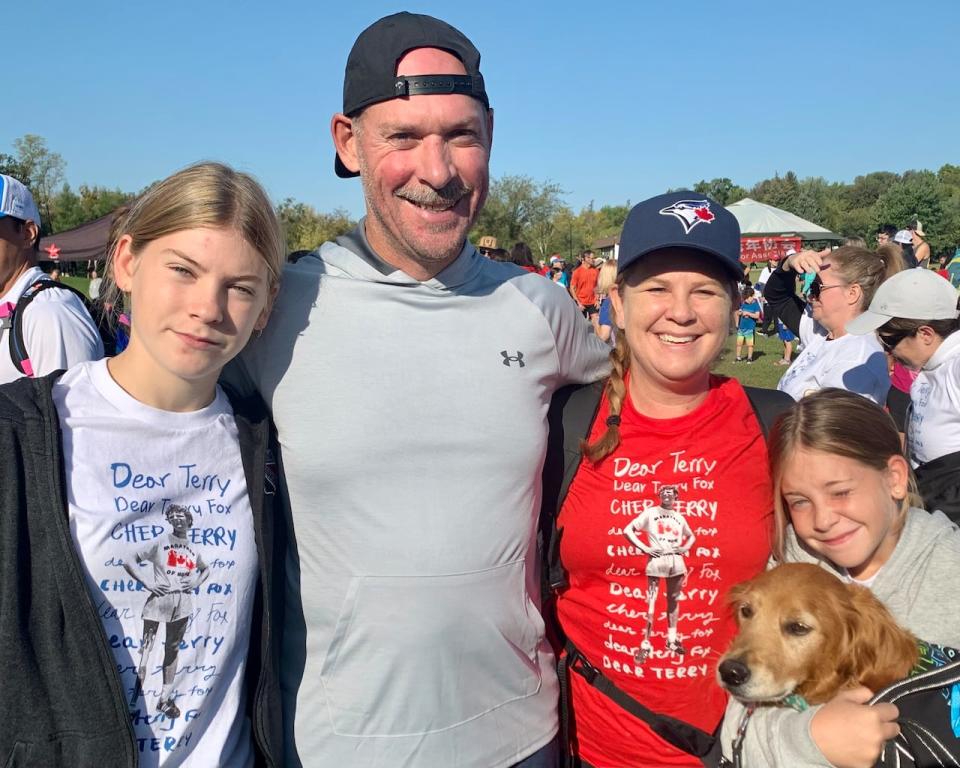Carrying on the dream: Fred Fox runs in Winnipeg to honour brother Terry

More than 43 years after Terry Fox ended what was meant to be a cross-Canada run, his older brother Fred crossed the finish line at the Terry Fox Run in Winnipeg, a city his little brother never reached on his Marathon of Hope.
"Winnipeg is pretty special," said Fox, whose family was originally from the city.
"He was so looking forward to getting here, and Winnipeg was preparing for Terry to arrive," he continued, adding he'd seen some of the posters made to greet his brother back in 1980.
"It's too bad Terry didn't make it here, but it's better to know that people in Winnipeg – people right across the province – are continuing Terry's dream."
Terry Fox was only 18 when he was diagnosed with osteogenic sarcoma, a cancer that led to the amputation of his leg above the knee.

Terry Fox during his run across Canada to raise money for cancer research. He did not finish the run and died in a Vancouver hospital in 1981. (The Canadian Press)
"He did some research and found that not a lot of money was being directed toward cancer research," said Fox's older brother. "He decided during his chemotherapy treatments that one day, he'd do something about it."
A few years later, the younger Fox, who at the time lived in Port Coquitlam, about 30 kilometres east of Vancouver, started his run in St. John's on April 12, 1980. He surpassed his goal of raising the equivalent of $1 from every Canadian before he died on June 28, 1981. More than $850 million has been raised to date through annual community runs across Canada and around the world.
"He's changed the whole landscape of how cancer research looks in this country," said Fred Fox, manager of supporter relations of the Terry Fox Foundation.
"We have some of the best researchers in the world today because of what Terry started in 1980. Lives have been changed, people are surviving their cancer diagnosis and living longer, being with their families longer than ever before."
A superhero
"He was a superhero," exclaimed cancer survivor Annie Macgregor, who takes part in the Winnipeg Terry Fox Run every year.
"I really connect with Terry and everything that he's done because his research – the dollars that went toward that – saved my life."

Cancer survivor Annie Macgregor called Terry Fox "a super hero" and credits the fundraising carried on in his legacy for saving her life. (Emily Brass/CBC)
Macgregor said she had two forms of leukemia when she was six years old. Now a mother of two, she has been cancer-free ever since.
"I bring my whole family here and they're inspired by him too," she said.
Macgregor said her team raised about $2,800 this year for the Terry Fox Foundation.
"Any time we're struggling, he's a reminder that you can, right?" she said, while stretching for the race.
Continuing his dream
Fred Fox said he wishes his brother could see the movement he inspired.
"Terry could never imagine that 43 years later, people would be continuing his dream in communities right across Canada," he said.
Fox remembers the poignant moment when his brother was forced to stop his run, as he tread across remote stretches of road on a prosthetic leg considered primitive by today's standards.
"It was very emotional to see Terry, especially during those long hilly days in Northern Ontario," he said.
"We knew he wasn't having the best of days, he was suffering a bit of an ankle injury," said Fox, his gaze dropping as he recalled the final leg of his brother's journey.
"When I was with him near Wawa, he had a bit of a cough."
Cancer had spread into Terry Fox's lungs, and he died the following summer.
"We thought maybe it was a cold, but we didn't know. Twelve days later, he had to stop his run in Thunder Bay."
He would have been satisfied
Fox is pleased to see people, born decades after his brother, are continuing to raise funds – especially children.
Eight-year-old Kemsley Braun made a beeline to Fox at Sunday's run, to snap a photo.
"I thought it would be special to meet Fred," Braun said, adding he's been learning about Terry Fox in school.

Kemsley Braun rushed to meet Fred Fox and take a photo with him, and said he's learning about Terry Fox in school. (Emily Brass/CBC)
"He decided to do something really nice for people who had cancer," Braun said.
Fox said his brother would have been happy to see the legacy he left behind.
"Him passing, the sacrifice he made – he would have said: 'If that's what it takes to be where we are today with cancer research,' he would have been satisfied with that."
Organizers of the Terry Fox Run in Winnipeg said they expected to surpass their goal of raising $60,000 this year for cancer research.


